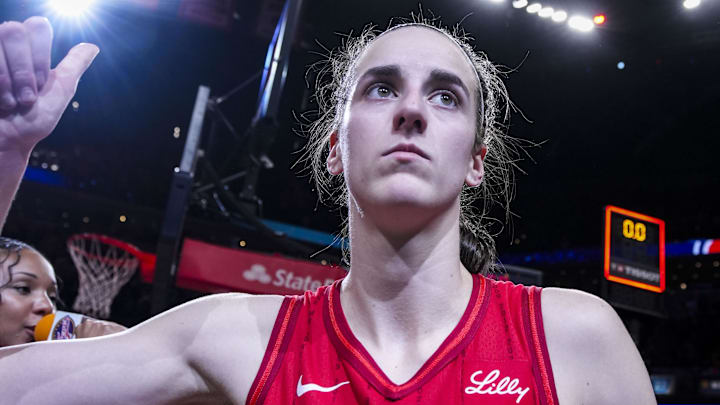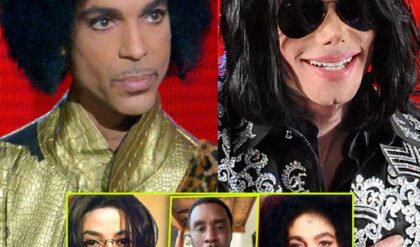Angel Reese Calls Out Caitlin Clark and ESPN: “The Media Manipulation Behind Rookie of the Year Rankings” In a bold and unexpected move, LSU star Angel Reese has made headlines after publicly revealing her frustrations with ESPN’s selection of Caitlin Clark as Rookie of the Year (ROTY).
Reese, who is no stranger to the spotlight, has accused Clark of manipulating the media to secure her award and took a strong stance against ESPN’s reliability when it comes to ranking athletes. Her fiery comments have sent shockwaves throughout the basketball world, sparking debates over fairness, media influence, and how athletes are judged in today’s sports landscape.

The Rising Stars of Women’s Basketball Both Angel Reese and Caitlin Clark are two of the brightest young talents in women’s basketball. Coming from different backgrounds and playing for powerhouse programs, the two athletes have often found themselves compared to one another.
Reese, a dominant forward known for her aggressive defense and rebounding prowess, helped lead LSU to a national championship in 2023 and has been heralded for her strong presence on both ends of the court.
Meanwhile, Clark, a sharp-shooting guard from the University of lowa, has dazzled audiences with her long-range shooting and ability to score from nearly anywhere on the court. Their careers have taken off almost in parallel, with each player becoming a household name in their respective spheres.
However, with ESPN’s announcement of Caitlin Clark as Rookie of the Year, tensions between the two stars seem to have reached new heights, especially as Reese has made it clear that she feels disrespected by the media’s treatment of her contributions.
Angel Reese Breaks Her Silence It all began when ESPN released their rankings and crowned Caitlin Clark as the Rookie of the Year. While many fans and analysts celebrated Clark’s recognition, it wasn’t long before Angel Reese took to social media and interviews to express her frustrations.
Reese, who was one of the top contenders for the ROTY award herself, made it known that she didn’t agree with the decision and felt that her own achievements had been overshadowed by the media’s fascination with Clark.
In a candid interview, Reese didn’t hold back: “Let’s be real-Caitlin Clark is a great player, but the way she’s worked the media, it’s like she’s getting credit for things other players are doing too, if not better. ESPN and the media eat it up because she fits their narrative. I’m just tired of seeing talented players getting passed over because the media decides who they want to hype up.”
Reese’s comments reflect a deeper frustration with how athletes are portrayed and celebrated in the media. She went on to explain that while Clark’s skills are undeniable, there’s an unfair bias in how certain athletes are promoted and how that promotion affects awards and rankings.
https://x.com/ESPN_WomenHoop/status/1836391884685766758?ref_src=twsrc%5Etfw%7Ctwcamp%5Etweetembed%7Ctwterm%5E1836391884685766758%7Ctwgr%5Eec8a16bd256090357ebf81967a9464e0d2597189%7Ctwcon%5Es1_&ref_url=https%3A%2F%2Fwww.si.com%2Fonsi%2Fwomens-fastbreak%2Fnews%2Fespn-eats-past-words-with-caitlin-clark-s-wnba-rookie-ranking-01j82t2bbe84
Clark “manipulated” the media is one that has sparked significant discussion. Reese alluded to the idea that Clark, whether consciously or not, has benefited from a media environment that is quick to latch onto certain narratives. According to Reese, this manipulation isn’t necessarily Clark’s doing alone, but a reflection of how the media picks and chooses which athletes to elevate. “Caitlin’s great, but let’s not act like she’s the only one putting in the work,” Reese said.
“It’s like the media decided she’s the face of women’s basketball, and everything she does gets blown up. Meanwhile, there are players out here grinding, achieving incredible things, and we barely get the recognition.”
The ESPN Controversy Reese’s comments about ESPN’s rankings were perhaps the most controversial part of her statement. She didn’t mince words when calling out the sports network, accusing them of being unreliable and biased in their selections. “ESPN is out here acting like their rankings are the gospel truth, but everyone knows they play favorites,” Reese said. “You can’t tell me that their ROTY pick wasn’t influenced by the media hype.
They’re not looking at the whole picture, just who’s trending on Twitter.” Her words resonated with a portion of the basketball community who have long criticized ESPN’s ranking system. Critics argue that ESPN’s rankings are often swayed by popular opinion, media narratives, and commercial interests rather than strictly on-the-court performance.
While some defended ESPN’s choice of Clark as Rookie of the Year, others sided with Reese, agreeing that the media plays a significant role in shaping how athletes are perceived and which players receive accolades.
The Larger Issue: Media Bias in Sports Reese’s outburst has opened the door for a larger conversation about media bias in sports, particularly in women’s basketball, where the visibility of athletes is still growing compared to the men’s game.
For years, critics have argued that certain athletes receive disproportionate attention due to their marketability, personality, or storylines that the media deems more compelling. This, they say, leads to an unequal playing field where some athletes are promoted and celebrated while others are ignored.
In Reese’s case, she feels that her own story, talent, and accomplishments have been overshadowed by the media’s fascination with Caitlin Clark. And she’s not alone. Other athletes have previously spoken out about feeling overlooked despite their success, pointing to a media landscape that tends to highlight a select few while ignoring the broader range of talent in the league. The Aftermath Angel Reese’s comments have set off a firestorm of reactions across social media and sports talk shows.
Some fans and analysts have come to her defense, agreeing that the media’s portrayal of athletes can be skewed and that awards like Rookie of the Year are influenced by more than just statistics. Others, however, feel that Reese’s comments are misguided and unfairly target Caitlin Clark, who has undoubtedly earned her place among the top players in women’s basketball.
Caitlin Clark herself has yet to respond directly to Reese’s claims, but sources close to her camp have indicated that Clark remains focused on her game and is choosing not to engage in the back-and-forth. As for ESPN, the network has stood by its selection of Clark as Rookie of the Year, stating that the decision was based on her outstanding performances and overall impact on the game.
Conclusion Angel Reese’s candid revelation has brought attention to the complicated relationship between athletes and the media. Her frustrations with how the media, particularly ESPN, shapes the narrative around certain players has ignited a larger debate about fairness in sports coverage.
While Caitlin Clark’s ROTY win is secure, Reese’s remarks have left a lasting impact on the conversation surrounding media bias in women’s basketball The question remains: Is the media truly responsible for manipulating the careers of athletes, or are players like Caitlin Clark simply riding the wave of their own success? One thing is for sure Angel Reese’s words have added fuel to an ongoing debate about recognition, respect, and the role of the media in shaping the future of women’s sports
News
Michael Jackson and Prince Warned Us About the Fall of Hollywood in 2024: ‘Not All That Glitters is Gold!’
Michael Jackson and Prince Warned Us About the Fall of Hollywood in 2024: ‘Not All That Glitters is Gold!’ In the world of pop music, Michael Jackson and Prince were two of the most iconic and influential figures. While their…
The strange bed that would make MICHAEL JACKSON live to be 150 years old.
The Strange Bed That Could Have Kept Michael Jackson Alive Until 150 Michael Jackson, the King of Pop, was a man surrounded by mystery. His life was full of eccentricities, but one of the most bizarre stories was his obsession…
At 43, Macaulay Culkin Finally Reveals the Shocking Truth About Michael Jackson
Fame often brings an unrelenting spotlight, where the line between public and private lives blurs. For the King of Pop, Michael Jackson, this was a constant reality. While his legendary performances captivated the world, rumors and speculations trailed closely behind….
Breaking: Angelina Jolie Can’t Stand Oprah! Here’s Why (Video)
In a surprising twist, recent reports suggest that tensions have emerged between Hollywood icon Angelina Jolie and media mogul Oprah Winfrey. According to sources, Jolie has grown increasingly frustrated with Oprah over what insiders describe as “philosophical differences” and conflicting…
$H0CKING NEWS: Michael Jackson Is Alive At 65 And Ready To Testify Against Diddy! (VIDEO)
A shocking revelation is rocking the entertainment world: Michael Jackson, the King of Pop, is reportedly alive at 65 and ready to testify against Sean “Diddy” Combs in a case that promises to bring explosive details to light. Since his…
“TRUST ME, DIDDY REALLY DID IT…” Michael Jackson and Diddy’s “Freak Off” Video Leaked, and Paris Jackson is Furious for the Second Time
In a shocking turn of events, a leaked video allegedly involving Michael Jackson and Diddy has surfaced online, stirring controversy and confusion across social media platforms. The purported footage, described as part of a “Freak Off” party, has drawn intense…
End of content
No more pages to load











